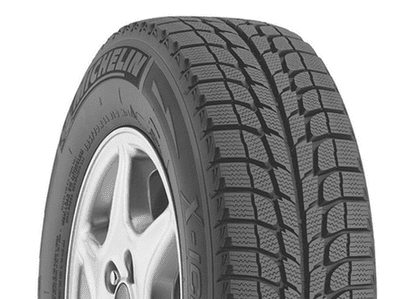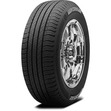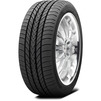
To Sipe or Not to Sipe?
Many tire shops will offer to sipe your tire for you to provide better traction during the winter. This process involves cutting small slits into the tire's tread with a machine that generally takes about 1 hour for 4 tires, and costs about $10 to $15 per tire.
If you look at the tire to the right you can see the small wiggly lines, which are the sipes in a Michelin X-Ice Xi2 winter tire. These sipes were put in by Michelin during the manufacturing process and specifically designed for this tire.
It is important to note that sipping only increases traction in mud, ice and snow, and will actually give you worse traction in both dry and wet conditions.
I would not sipe a tire that did not come already sipped as it will most likely void the tire's warranty. When tires are siped (whether at the factory or your local tire shop) they will make noticeably more noise on the road as well.
When tires are siped by your local tire shop, they can change the tread blocks and the way the tire was intended to perform. You can then also pick up small debris from the road into the slits which can negatively impact the tire's traction. When not properly siped, the tire will rub against itself when it comes into contact with the road which will cause extra friction and heat.
Many tire shops will offer to sipe your tire for you to provide better traction during the winter. This process involves cutting small slits into the tire's tread with a machine that generally takes about 1 hour for 4 tires, and costs about $10 to $15 per tire.
If you look at the tire to the right you can see the small wiggly lines, which are the sipes in a Michelin X-Ice Xi2 winter tire. These sipes were put in by Michelin during the manufacturing process and specifically designed for this tire.
It is important to note that sipping only increases traction in mud, ice and snow, and will actually give you worse traction in both dry and wet conditions.
I would not sipe a tire that did not come already sipped as it will most likely void the tire's warranty. When tires are siped (whether at the factory or your local tire shop) they will make noticeably more noise on the road as well.
When tires are siped by your local tire shop, they can change the tread blocks and the way the tire was intended to perform. You can then also pick up small debris from the road into the slits which can negatively impact the tire's traction. When not properly siped, the tire will rub against itself when it comes into contact with the road which will cause extra friction and heat.
Conclusion:
I would definitely buy siped tires for winter conditions such as ice and snow, when the tires come siped from the manufacturer. The benefits and performance are highly noticeable. I would not have a tire shop sipe tires due to warranty issues and complications that can arrise such as overheating and changes in the tread block that negatively impact performance.
I would definitely buy siped tires for winter conditions such as ice and snow, when the tires come siped from the manufacturer. The benefits and performance are highly noticeable. I would not have a tire shop sipe tires due to warranty issues and complications that can arrise such as overheating and changes in the tread block that negatively impact performance.
All Season Performance Tires
Excellent response and handling in wet and dry conditions, as well as light snow.
Excellent response and handling in wet and dry conditions, as well as light snow.
Performance Summer Tires
Low profile tires provide great handling and traction for both dry and wet conditions
Low profile tires provide great handling and traction for both dry and wet conditions






